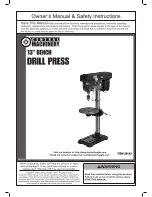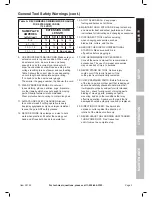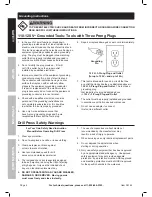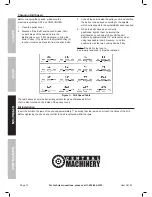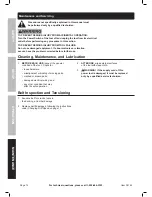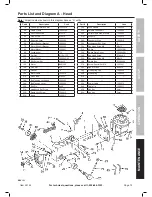
Page 7
For technical questions, please call 1-800-444-3353.
Item 38142
Table and Support Arm to Column
1. Remove the Rack (2B) from the Column (1B) by
slackening off the Collar Set Screw (11B) and
removing the Collar (19B). The rack is stowed
in this position only for transit purposes.
2. Lubricate the Worm Gear (18B) with light grease, and
insert shaft first into Worm Gear Housing in the Arm
which should fully mesh with the Helical Gear (17B).
Hold it in this position. The Worm Gear Shaft
will extend through the housing to be ready
for the crank to be attached in a later step.
3. Gently slide the arm assembly over the column
and hold it steady while inserting the Rack (2B)
down through the Worm Gear Housing, meshing
with the Helical Gear (17B), ensuring the long
smooth end of the rack is uppermost. The bottom
end of the rack will be located in the groove
formed by the column support and the column.
4. Hold the machine in this position while replacing the
collar on the column, and ensure that the end of the
Rack (2B) is firmly engaged in the groove formed
between the collar and the column. However, make
sure the Rack is not pinched and there is a working
clearance between the Rack (2B) and Collar (19B).
5. Firmly secure the Collar (19B)
with the Set screw (11B).
6. Thread the Arm Locking Handle (16B) in from the
left, and tighten to secure the arm to the column.
7. Attach the Table Crank (8B) to its spigot
and tighten the securing screw.
8. Slacken off the arm locking handle and turn the
crank, testing to ensure that the arm will move the full
length of the rack easily, without binding, and will also
rotate about the column evenly, and without binding.
9. IF TOO TIGHT, Nudge up the Arm Locking Handle
and slacken off the Collar Set Screw. Adjust to
give a greater working clearance between the rack
and collar, tighten the set screw, and test again.
10. Insert the table into its housing on the arm
and secure with the Table Clamp (13B).
Head to Column
1. It may be necessary to unscrew the Head Lock
Set Screws (21A) slightly to ensure they do
not protrude internally, as this would prevent
the head from sliding fully into position.
2. With assistance, raise the Head (1A)
and locate it on top of the Column.
3. Align the head with the base, and firmly
secure with the Set Screws (21A).
4. Screw the three Feed Handles (24A) and screw them
firmly into the hub of the Spindle Feed Shaft (25A).
Installing the Chuck
1. With the Chuck Guard lifted clear of the
spindle nose, slide the work table up the
column to within 6″ of the spindle.
2. Open the jaws of the chuck to their maximum,
using the Chuck Key supplied.
3. Put a piece of scrap wood on the table
to protect the Chuck Nose.
4. Ensuring all parts are thoroughly clean
and dry and burr free, insert the Arbor (14)
firmly into the end of the Chuck (15).
5. Insert the other end of the arbor, with the chuck now
attached, into the end of the Spindle Shaft (13),
turning, where necessary, to ensure that the
point on the end of the arbor locates correctly
with the drive slot in the spindle shaft.
6. Pull the spindle down using the feed handles,
pressing the chuck nose hard against a piece of scrap
wood on the table, to press the chuck into place.
Pulley Cover Knob
Locate the knob with Pan Head Screw (22)
and attach to the cover. Screw on tightly.
SAFETY
OPERA
TION
MAINTENANCE
SETUP
Summary of Contents for 38142
Page 1: ......

